Digital Pulse Analysis July-Sept 2008
Background
Digital Pulse is a confidence index for the digital industry, reflecting the degree of optimism or pessimism that people working in digital media feel about the industry. It is designed to find out how industry professionals are feeling, how they perceive the current digital business climate, salary conditions and their views on what it’ll be like in 6 months time.
Each month, Chinwag polls it’s community, made up of practitioners working across the digital industries, to create a barometer of attitudes and confidence.
The indices for Digital Pulse are released each month, with a detailed trend analysis undertaken each quarter. This report details the findings of the September survey, as well as an overall view of how market sentiment has changed during Q3 2008.
Chinwag is a community media company providing a focal point for digital media practitioners in the UK and beyond: http://www.chinwag.com.
For further information or comments, contact us.
Index
- Background
- Executive Summary
- Index performance over Q3 2008
- Overall performance Q2 versus Q3 2008
- Comparison of the indices
- Confidence in current market conditions Q2 versus Q3
- Confidence in future market conditions Q2 versus Q3
- Whether there are ample job opportunities Q2 versus Q3
- Intention NOT to move jobs
- Current salary satisfaction
- Experience for permanent roles
- Current market confidence by employment type
- Current market confidence by salary bracket
- CCI change for Q2 and Q3
- Market sentiment by sector
- Conclusions
- Methodology
- About Chinwag
Executive Summary
The Digital Pulse provides a benchmark for confidence across the digital industry.
The index for September 2008 was 112.4, the lowest level since we began taking the Digital Pulse. This continued the downward trend that began in August, falling a further 7.5% month on month. Despite the drop however, the market’s response remained in the positive range, which was encouraging considering the overall economic environment. The overall sense is that while the overall environment is unnerving, the digital sector has a slightly stronger ability to weather the storm than some other market sectors. While the Digital Pulse was also down quarter on quarter, this was only by 8.6%. However once the banking crisis began to dominate the news agenda again, sentiment fell fast.
The Digital Pulse is measured over a baseline of 100, where 100 equates to a neutral response on a sale of 0-200.
Return to Index | Take the Digital Pulse
The Indices
The individual indices that make up the overall Digital Pulse are:
It’s hardly surprising that all the indices showed a drop during September. The economic impact of the global credit crisis is having a negative effect on market perception. However, it’s important to note that despite growing negativity, overall market sentiment remained positive. In fact, although sentiment fell overall during Q3 2008, perceptions of the job market remained fairly steady, with 62% of respondents continuing to see ample job opportunities.
By summarising these 6 key responses, we are able to provide two further indices which report industry confidence in the current climate, as well as expectations for how the market will be faring in six months time.
These are as follows:
(down 9.1% month on month)
(down 4.9% month on month)
While there has been a significant decrease in market confidence about the immediate future, the fall in confidence about future conditions is less abrupt and, once again, seems directly correlated with wider market conditions. It should be noted that while overall confidence fell in both July and August, it was the month of September that saw the most significant drop.
There are continuing concerns about the economic impact of increasing costs of consumer goods; energy, fuel etc., combined with uncertainty about the ongoing financial environment. This includes the ability to raise funds, set up a line of credit, or otherwise navigate the market. The areas of the digital industry showing least confidence are unsurprisingly those involved in advertising, marketing and e-commerce – three areas where consumer confidence is necessary to drive sales.
Index Highlights
- Continuing concerns about the impact of global financial turmoil impact sentiment on current market conditions
- Only 44% of respondents were fairly or very positive about current market
conditions in September, continuing the downward trend over the quarter. It also
marks the first time that positive responses have been less than 50%. It’s worth
noting that only 4% of respondents were very negative, and only 17% fairly
negative, reflecting the reality that market conditions are strongly dependent
on wider market drivers. With 35% of respondents neutral on market conditions,
there is an increasing concern that while belt-tightening can lead to budgets
being transferred from offline to online, once you pass a certain point all
budgets are affected. Confidence was down 10.2% from the end of Q2.
- Confidence in the future remains steady
- Confidence in future market conditions also continued to deteriorate a
little, with 44% of respondents either fairly or very positive about the
future. There was a slight increase in reported concern about the market,
with 5% of respondent’s very negative and 21% fairly negative about the
future. There seems to be a shift towards negative sentiment from the more
neutral position seen at the end of Q2. Overall positive sentiment dropped
6.3% over the quarter.
- Digital recruitment remains steady
- Around 47% of respondents were positive about continued employment
opportunities. However, since the end of Q2 the number of respondents
reporting a neutral view of the recruitment market increased from 19% to
30%, while strongly negative responses doubled over the period from 3% to
6%. While this remains a small proportion of the response, there is
definitely increasing concern about the job market as a corollary of general
market concern. 54% of respondents were clear that their intention was to
stay put, with 32% of respondents actively intending to find new work.
- Permanent staff remain more confident than freelancers, but freelance opportunities are still available
- Permanent staff reported less outright negativity about current market
conditions than freelancers, however neutral responses from a significant
proportion of permanent employees meant that there was stronger positive
perception from the freelance community. There was a higher percentage of
respondents showing confidence in opportunities for permanent roles at 54%,
against 31% reporting agreement with the belief that there are opportunities
for freelance roles.
- Clientside/ecommerce boasts highest confidence
- The most positive sector of the market was clientside/ecommerce, however
the sector also boasted the strongest negative responses. There seems to be
a sectoral breakdown within the client base that affects positivity. Design
agencies reported the highest negative response rates in September and only
web agencies and advertising and marketing groups reported any very positive
responses at all.
- Online publishing goes neutral while concern rises for design
- At the end of the last quarter, online publishers were reporting the
strongest negative sentiment at 36%. However, September’s responses saw a
massive increase in neutral response from this sector, with less that 10%
reporting negative sentiment. Meanwhile, design agencies reported the most
negative sentiment, at nearly 60%, although no responses were very negative.
- Confidence falls as salary bracket increases
- The Digital Pulse has usually seen the highest confidence from industry
figures in the highest salary brackets, but August and September saw a
significant increase in concern above the £60,000 a year mark.
Return to Index | Take the Digital Pulse
Index review for September
Digital Industry sentiment in September 2008
Current Market Conditions
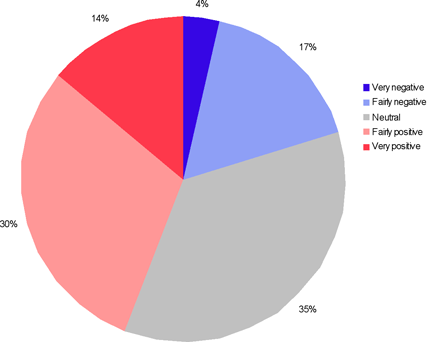
Market conditions in six months
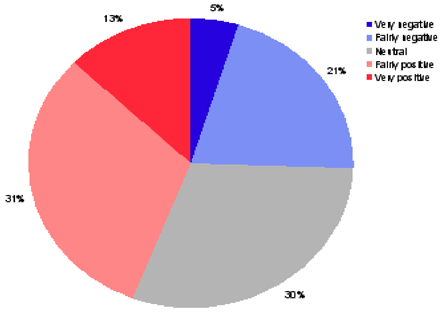
Ample employment opportunities
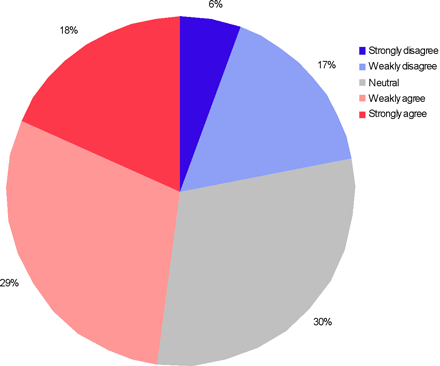
Intention not to move jobs
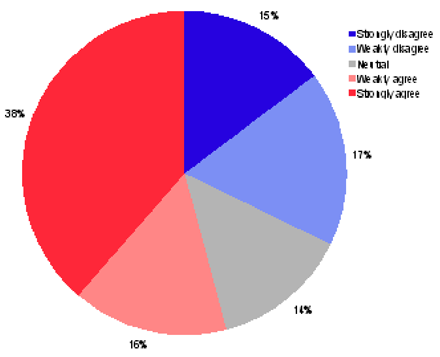
Confidence in opportunities for freelance roles
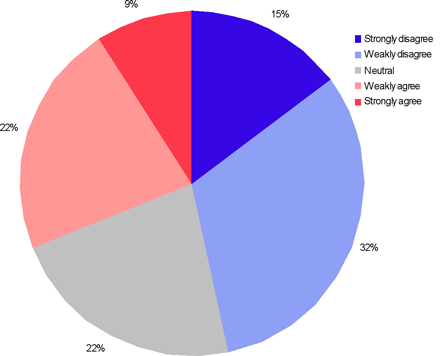
Confidence in opportunities for permanent roles
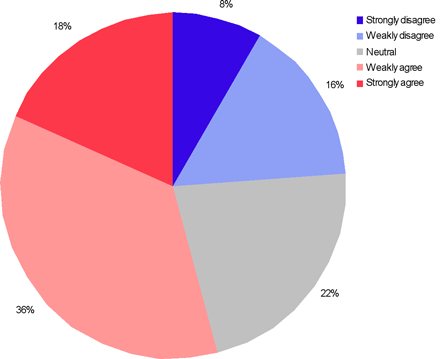
Confidence in current market conditions by permanent and freelance roles
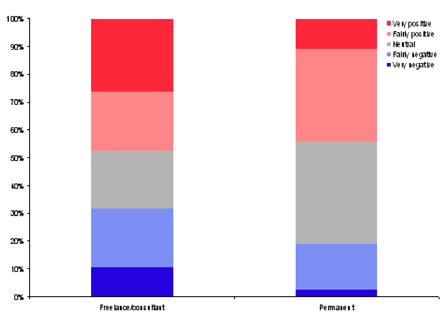
Return to Index | Take the Digital Pulse
Index performance over Q3 2008
Market confidence over the quarter
Overall confidence has fallen significantly since the end of Q2 2008. Despite wider market conditions the market increased in confidence between May and July 2008 and remained fairly steady through August. However, the ongoing negative news agenda has had a clear impact on market perception over the period.
Market confidence over the quarter

Index performance over Q3 2008 and compared to Q2
| Index | Sep 08 | Aug 08 | Jul 08 | Q3 | Q2 | |
| Current market conditions | 117.0 | 129.2 | 128.8 | 125.9 | 136.3 | |
| Market conditions six months from now | 113.3 | 120.4 | 120.9 | 120.9 | 127.3 | |
| Employment opportunities | 119.3 | 135.25 | 134.3 | 131.3 | 138.3 | |
| Intention not to move jobs | 122.9 | 128.2 | 131.4 | 126.4 | 120.3 | |
| Current salary satisfaction | 89.4 | 94.4 | 99.7 | 93.1 | 94.7 | |
| Employer preference for permanent experience | 120.2 | 122.2 | 121.6 | 12.5 | 119.3 | |
| Confidence in current conditions | 108.6 | 119.6 | 120.9 | 116.8 | 123.1 | |
| Confidence in expected conditions | 118.1 | 124.3 | 126.1 | 120.9 | 127.3 | |
| Consumer Confidence Index | 112.4 | 121.5 | 123.0 | 119.5 | 123.4 |
Current market conditions over the quarter
While there is a clear pattern of increasing concern over the quarter, the majority of respondents remain positive or neutral about current market conditions.
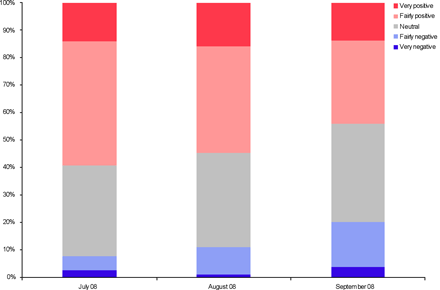
Future conditions – six months from now
Perceptions of future market conditions closely reflect patterns seen regarding the current conditions, including an increase in neutral responses. Over the quarter, there was an increase in negative perceptions of the future.
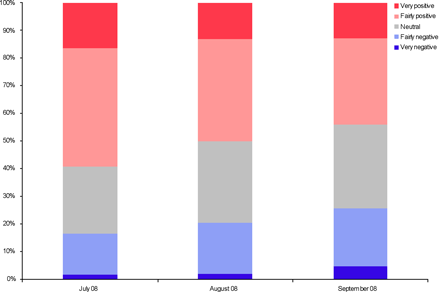
Perception of ample job opportunities
Once again, positive responses diminished over the quarter with around 50% of responses being negative or neutral.
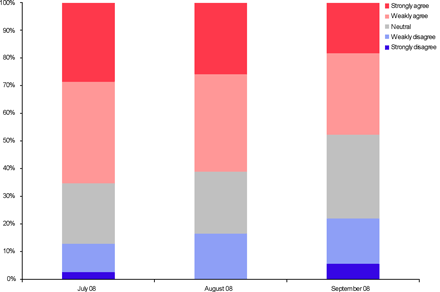
Intention to remain in place in current role
There was little change over the quarter in terms of the number of respondents with a strong intention to stay in their current role, however where was an increase in the number of respondents with a clear intention of moving on within the upcoming six months.
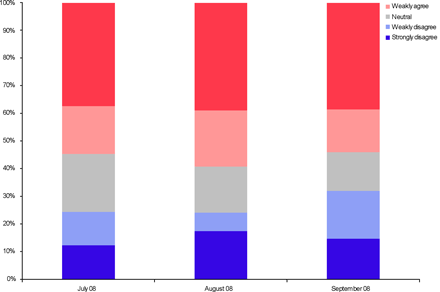
Satisfaction with current salary
Each month over the quarter showed an increase in the number of respondents unsatisfied with their current salaries. By the end of the quarter, less than 30% were satisfied, or strongly satisfied, with their pay.
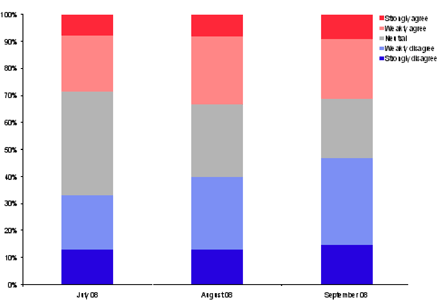
Extent to which employers are more likely to hire people with permanent experience
While the belief that employees would choose to retain staff with permanent experience remained fairly steady over the quarter, there is a growing perception that freelance experience is becoming more useful. While freelance staff may have increased difficulty in finding permanent roles, there is an increasing requirement for freelance staff as the market tightens.
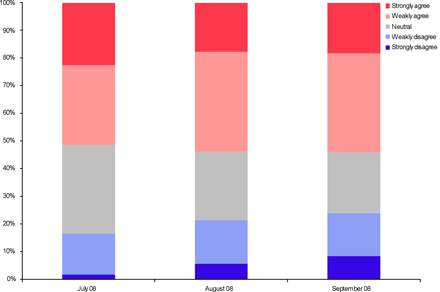
Confidence in current market conditions by salary
At the beginning of the quarter, respondents in the top end of their careers (£90k+) were generally more positive than those in lower salary ranges (<£30k). Responses over the quarter show that those with salaries in the middle range are maintaining a positive or neutral stance on the market. However, those at the top end of the salary range are beginning to show less confidence, while those at the bottom end of the salary range are increasing in confidence. This may well be a reflection of an increasing requirement to justify higher salaries in difficult market conditions.
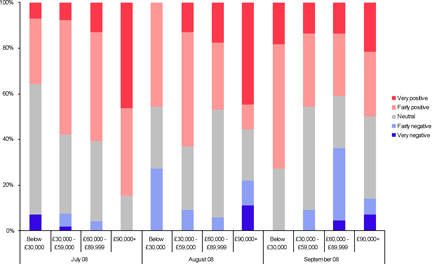
Change in CCI by salary bracket across Q3
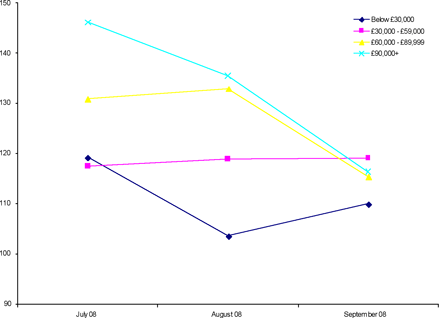
Confidence in market conditions by employment type
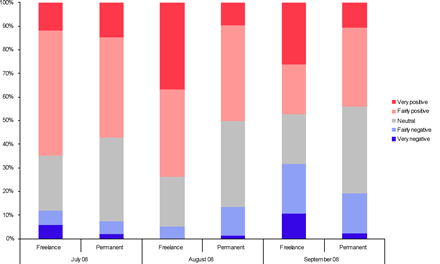
Confidence by sector
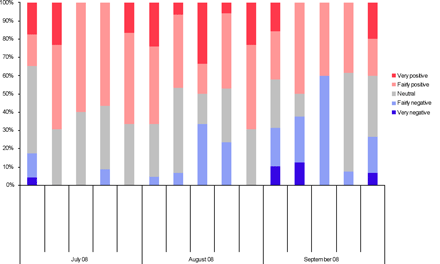
Return to Index | Take the Digital Pulse
Index performance Q3 versus Q2 2008
Comparison of the indices
| Index | Q3 | Q2 |
| Current market conditions | 125.9 | 136.3 |
| Market conditions six months from now | 120.9 | 127.3 |
| Employment opportunities | 131.3 | 138.3 |
| Intention to not move jobs | 126.4 | 120.3 |
| Current salary satisfaction | 93.1 | 94.7 |
| Employer preference for permanent experience | 123.5 | 119.3 |
| Confidence in current conditions | 116.8 | 123.1 |
| Confidence in expected conditions | 120.9 | 127.3 |
| Consumers Confidence Index | 119.5 | 123.4 |
Confidence in current market conditions Q2 versus Q3
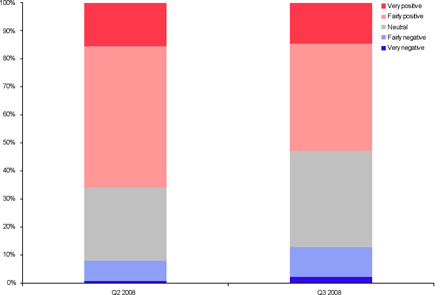
Confidence in future market conditions Q2 versus Q3
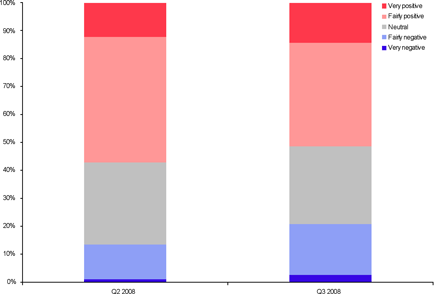
Whether there are ample job opportunities Q2 versus Q3
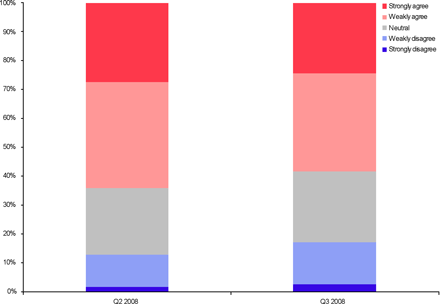
Intention NOT to move jobs
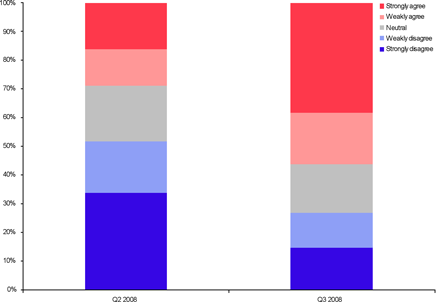
Current salary satisfaction
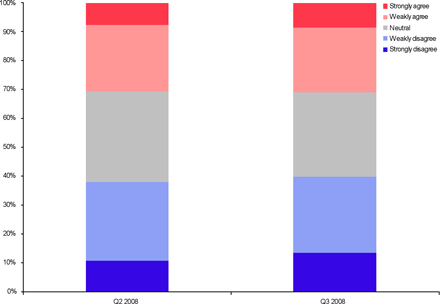
Experience for permanent roles
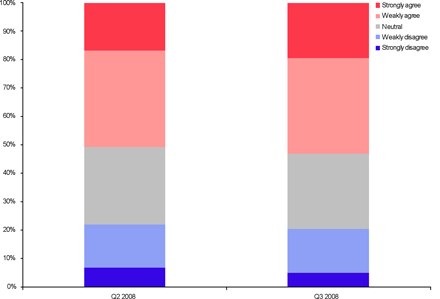
Current market confidence by employment type
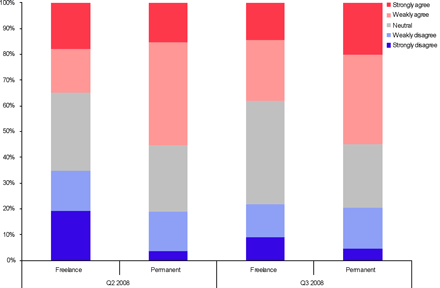
Current market confidence by salary bracket
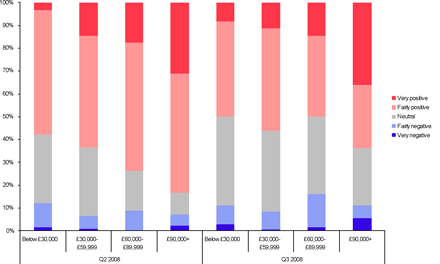
CCI change for Q2 and Q3
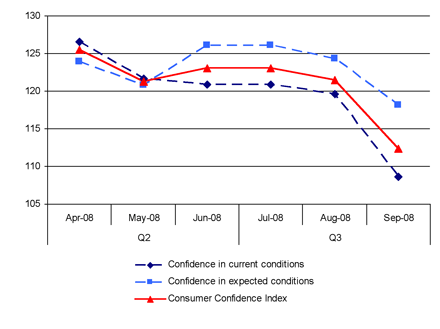
Return to Index | Take the Digital Pulse
Market sentiment by sector
Overall sector trends in sentiment over Q3 2008
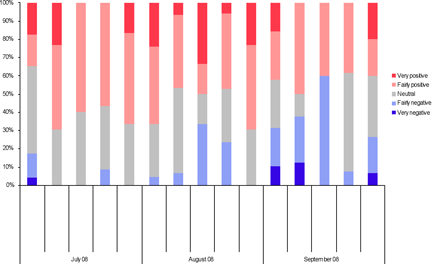
NB where no bar appears, no change in sentiment was reported.
Change in CCI by sector across Q3
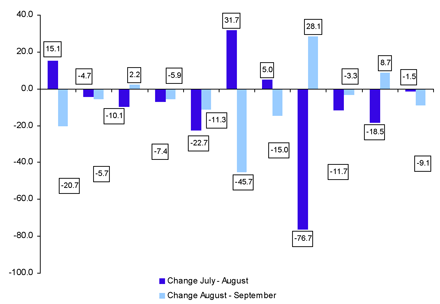
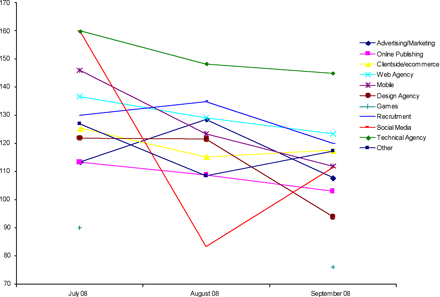
Return to Index | Take the Digital Pulse
Conclusions
While confidence in current market conditions remains positive (index of 112.4), it has fallen significantly over the last quarter, especially during the month of September.
While the current economic environment still supports the move of budgets from offline to digital, there is increasing concern that economic constraints may be sufficiently strong to affect all budgets. While digital options may help generate efficiencies and cost savings, this won’t make sufficient difference if the wider economy slows down any further.
Those who have been in the industry longer, and are at the top of their professions, have shifted their position over the last quarter, moving from a predominantly positive outlook to an increasingly negative one.
Once again, there has been a change in sectors reporting increased concern. This happens frequently and potentially reflects the fast moving nature of the digital sector. While unsurprisingly web and advertising agencies are expressing the greatest concern, online publishing (which has showed fairly strong negative perception over the last couple of quarters) has moved to a predominantly neutral stance.
The next quarterly analysis of the Digital Pulse will cast further light on whether or not the quarter’s downward turn was due to a reaction to the wider news agenda, or reflects a more deep-rooted downturn in market confidence.
Return to Index | Take the Digital Pulse
Methodology
This short survey was designed to gauge confidence feedback from the people
that work in the digital industry. The respondents were self-selecting from the
audience across Chinwag’s network of websites and links from high-profile
industry blogs.
Details about the survey:
- Response were gathered from 1st July to 30th September 2008
- Data and analysis obtained from 463 responses altogether
- All surveys were completed anonymously
Return to Index | Take the Digital Pulse
About Chinwag
The Chinwag community is a focal point for digital media practitioners in the UK and beyond. Founded in 1996, Chinwag has developed into a community media company that publishes websites, discussion forums and runs events supporting the people and companies who work in the digital industry.
Chinwag publishes Chinwag Jobs (http://jobs.chinwag.com), the leading recruitment website for Online Marketing, Digital Media, Web, Design and Technical positions. British Sky Broadcasting, Google, Yahoo, Vodafone, Yell and the majority of recruitment agencies who place staff in the sector use the service.
Chinwag Live is the company’s event series founded to cast light on trends in the digital media and marketing industry covering topics such as social media measurement, web TV, mobile advertising, online PR and many more. These sessions have sold out throughout 2008 and gained a strong reputation for debate and knowledge sharing.
Chinwag’s community is focused around its live events, networking, blogs and email forums. The first forum, an email discussion list called uk-netmarketing, is acknowledged as a key destination for industry professionals. Chinwag’s community has now grown to cover other topics including design, usability, social media and wireless marketing, generating more than one million emails every month.
Chinwag also runs Viralmonitor (http://www.viralmonitor.com), which is used to promote viral marketing campaigns. Featured brands include Make Poverty History, Visit London, Sky Sports, Swiftcover.com, Cartoon Network, BBC Five Live, Bacardi, GMTV and the RSPCA.For more information see: http://www.chinwag.com/about

